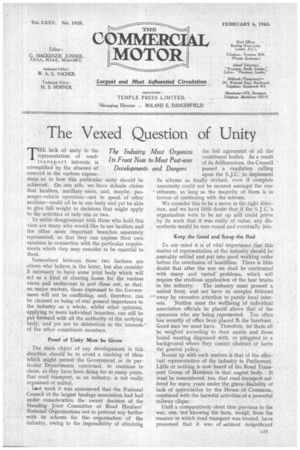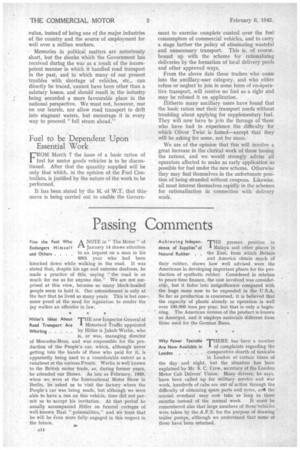The Vexed Question of Unity .
Page 15

Page 16

If you've noticed an error in this article please click here to report it so we can fix it.
THE lack of unity in the representation of road transport interests is exemplified by the absence of concord in the various expressions as to how this particular unity should be achieved. On one side, we have definite claims that hauliers, ancillary users, and, maybe, passenger-vehicle operators—not to speak of other sections—could all be in one body and yet be able to give full weight to decisions that might apply to the activities of only one or two.
In entire disagreement with those who hold this view are many who would like to see hauliers and the other more important branches separately represented, so that they can express their own opinions in connection with the particular requirements which they may consider to be essential to them.
Somewhere between these • two factions are others who believe in the latter, but also consider it necessary to have some joint body which will act as a kind of clearing house for the various views and endeavour to sort these out, so that, on major matters, those expressed to the Government will not be conflicting, and; therefore, can be claimed as being of real general importance to the industry as a whole, whilst other opinions, applying to more individual branches, can still be put forward with all the authority of the unifying body, and yet not be -deleterious to the interests of the other constituent. members.
Proof of Unity Must be Given The main object of any developments in this direction should be to avoid a clashing of ideas which might permit the Government or its particular Departments concerned, to continue to claim, as they have been doing for so many years, that road transport, as an industry, is not really organized or united.
Last week it was announced that the National Council of the largest haulage association had had under consideration the recent decision of the Standing Joint Committee of Road Hauliers' National Organizations not to prerceed any farther with its scheme for theorganization of the industry, owing to the impossibility of obtaining the full agreement of all the' constituent bodies. As a result of its deliberations, the Council passed a resolution calling upon the S.J.C. to implement its scheme as finally revised, even if complete unanimity could not be secured amongst the con' stituents, so long as the majority, of them is in favour of continuing with the scheme. We consider this to be a move in the right direction, and we have little doubt that if the S. J.C.'s organization were to be set up arid could prove by its work that it was really of value, any dissentients would be won round and eventually join.
Keep the Good and Scrap the Bad To our mind it is of vital importance that this matter of representation of the industry should be amicably settled and put into good working order before the conclusion of hostilities. There is little doubt that after the war we shall be confronted • with many and varied' problems, which will require the studious application of the best brains in -the industry. The industry must present a united front, and not have its energies frittered away by excessive attention to purely local inter ests. Neither must the wellbeing of individual association officials be placed above that of the .operators who are being ,represented. Too often has security of office been placed ih the forefront. Good men we must have. Therefore, let them all be weighed according to their merits and those found wanting dispensed with, or relegated to a background where they cannot obstruct ot harm the general policy. • Bound up with such matters is that of the effectual representation of the industry in Parliament. Ltle or nothing is now heard of the Road Transport Group of Members in that august body. It must be remembered, too, that road transport suf • fered for many years under the grave disability of lack of appreciation by the House of Commons, • combined with the harmful activities of a powerful .railway clique. • • .
• Until a comparatively short time previous to the -war, one; riot knowing the facts, would, from the • manner in -which road transport was treated, have presumed that it was of lmost insignificant value, instead of being one of the major industries of the country and the source of employment for well over a million workers.
• Memories in political matters are notoriously short, but the shocks which the Government has received during the war as a result of the incompetent manner in which it handled road transport in the past, and to which many of our present troubles with shortage of vehicles, etc., can directly be traced, cannot have been other than a salutary lesson, and should result in the industry being accorded a more favourable place in the national perspective. We must not, however, rest on our laurels, nor allow road transport to drift into stagnant waters, but encourage it in every way to proceed "full steam ahead."
Fuel to be Dependent Upon Essential Work
FROM March 7 the issue of a basic ration of fuel for motor goods vehicles is to be discontinued. After that the quantity supplied will be only that which, in the opinion of the Fuel Controllers, is justified by the nature of the work to be performed.
It has been stated by the M. of W.I. that this. move is being carried out to enable the Govern ment to exercise complete control over the fuel consumptio-n of commercial vehicles, and to carry a stage farther the policy of eliminating wasteful and unnecessary transport. This is, of course, bound up with the scheme for rationalizing deliveries by the formation of local delivery pools and other approved ways.
From the above date those traders who come into the ancillary-user category, and who either refuse or neglect to join in some form of co-operative transport, will receive no fuel as a right and may be refused it on application.
-Hitherto many ancillary users have found that the basic. ration met their transport needs without troubling about applying for supplementary fuel. They will now have to join the throngs of those who have had to experience the difficulty for which Oliver Twist is famed—except that they will be asking for some, not for more.
We are of the opinion that thiS will involve a great increase in the clerical work of those issuing the rations', and we. wouldstrongly advise all operators affected to make as early application as possible for fuel under the new scheme. Otherwise they may find themselves in the unfortunate position of being stranded without coupons. Likewise, all must interest themselves rapidly in the schemes for rationalization in -connection with delivery work.




















































